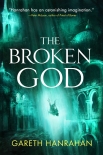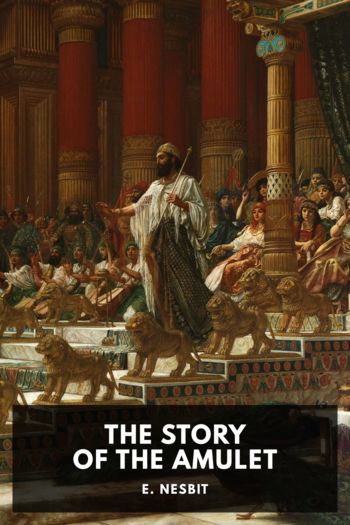The Broken God, Gareth Hanrahan [best historical biographies TXT] 📗

- Author: Gareth Hanrahan
Book online «The Broken God, Gareth Hanrahan [best historical biographies TXT] 📗». Author Gareth Hanrahan
She confronts him about it one morning, after a sleepless night spent wondering.
“Captain… you said there was a storm when Ishmere attacked, and the Lord of Waters pulled the Rose out of it. That’s why you think you owe him, right?”
“I asked the Lord of Waters to save me and my crew, and we were saved.”
“Right. But… the ship was safe, then, wasn’t it? There was a time between Ilbarin getting fucked by Krakens, and the Ghierdana bastards showing up with their dragons and beaching the Rose, when you could have just sailed away, yeah?”
“I could have. I chose not to. Or it was chosen for me. It is folly, I say, to deny the gods.”
“Deny them – what? Deny them what you owe, is it?”
Hawse shakes his head. When he speaks next, it’s with slow deliberation, like every word must laboriously be twisted around the capstan of his mind. “I think that we do not… admit, as we should, that we are… flotsam on the waves. Everything we are, all we think, is shaped by the gods. By all the gods, blowing us this way and that.”
He looks across the table at Cari, frowning. “You told me that when the war goddess Pesh was destroyed—”
“When I fucking killed her.”
“Foul language is unbecoming of you,” he mutters, then continues. “When you slew Pesh, the people of Ishmere forgot how to make war.”
“Sort of.” A wave breaks loudly at the stern of the ship, and the sudden noise startles her. She can’t hear the cries of the birds on the shore, either, any more, although she can hear scraping and scratching on the cabin roof. She can’t shake the feeling that something’s eavesdropping, a prickling feeling in her soul. “After I hit Pesh with the god-bomb, the Ishmerians were confused. They could still fight, but it was like they’d taken a blow to the head.”
“It was like that everywhere. Pesh was war. She was on every battlefield, in the heart of every soldier.”
“Every Ishmeric soldier.” Cari pushes her own bowl away, feeling unwell.
“Every soldier,” repeats Hawse. He dips his spoon into the dregs of his stew, lets chunks of fish fall back into the gruel. Watching them splash, little droplets of grease landing on the table, like an augury. “Some more than others. A… way of war, of thinking about war, died by your hand.” He takes a deep breath. “When I sailed, I was more… no, there is no ‘I’. This… mortal shell…” He gestures down at his own body, “was inhabited more by an aspect of the Lord of Waters than any other god. When I bargained in the ports of the trader cities, was I not more Blessed Bol then? When I smuggled and stole, was I not Fate Spider? This thing I call my mind, what is it but, a – a weathervane for gods?” Hawse’s voice quavers with the effort of articulation, like he has to use his whole body to force out the word. Shoulders, hands, belly, all labouring. Something about his movements makes her think of a man wading through rough water, trying to make his way back to shore to tell her what he saw in the deeps.
“Godshit,” snaps Carillon. She hasn’t heard that exact philosophy before, but she’s heard variants. Safidists back in Guerdon, trying to hammer their souls into perfect alignment with the gods. Mystics who mutter that the physical world is an illusion, and that all that matters is the invisible, aetheric realm of the gods.
“No. The Lord of Waters filled me that day. I saw Him. I was Him. I am Him, I pray. What is time to the gods?”
“Godshit,” says Cari again. She’s about to say more – to decry Hawse’s fatalism, to say that it all means nothing anyway, that blaming the gods is just a coward’s excuse – but suddenly her stomach empties itself, everything rising up in a burning torrent and gushing out of her mouth. Unreasoning terror catches up with her, a wave crashing over all the walls she’s built around herself. It’s not true. People are more than puppets for gods.
She falls to her knees, shivering.
In the hollowness that follows the bout of vomiting, she finds a horrible thought. If Hawse is right, if mortals are nothing more than walking vessels for the stray thoughts of disembodied gods, then what is Carillon? She was made to channel the thoughts of the Black Iron Gods, to be their saint, their herald. Monstrous, murderous gods, full of hate and hunger. Machines for torture, great iron weights squeezing the breath out of the world.
But Cari ran away from home, ran away to the Rose, because the Black Iron Gods called to her. They called to her – they weren’t her. She’s not an embodied echo of a monster, a puppet without free will. She refuses to believe that. There has to be something inside her that doesn’t spring from the Black Iron Gods or any other deities, and wasn’t made by her grandfather’s sorcery, some inner core that’s uniquely hers.
Can you be sure? a cruel voice within her asks, and in that moment she doesn’t know if it’s a part of her mind or if it’s coming from outside her, or if there’s even any of her at all, and not just the Godswar in miniature inside a mortal skull. Rat was possessed by a ghoul demigod, and tried to kill you. Your friend tried to murder you. You’ve seen saints channel the gods, talk for the gods. Silva channeled the Kept Gods, and they tried to kill you, too. You’ve seen gods intervene in big ways. Why not in small ones? What if you don’t exist, and it’s all just the gods pulling this way and that? What if you’ll never be free of the





Comments (0)